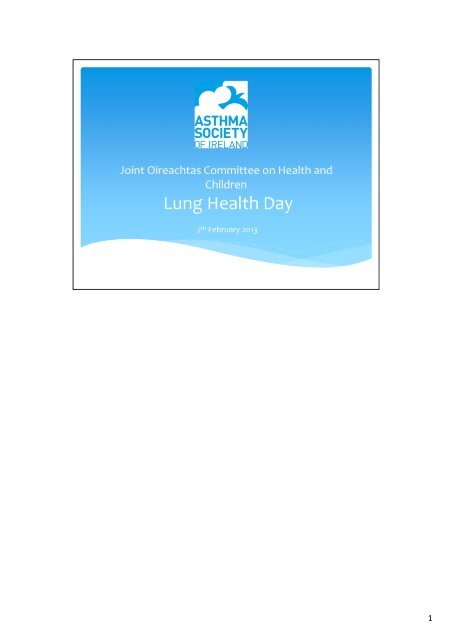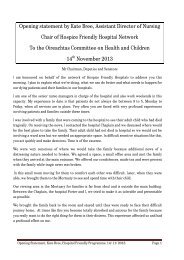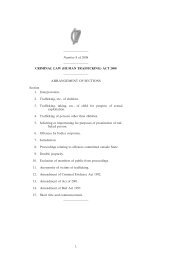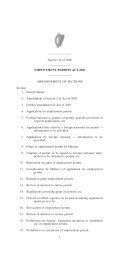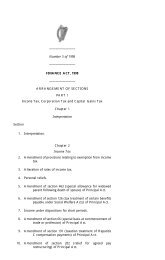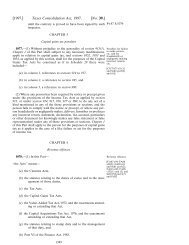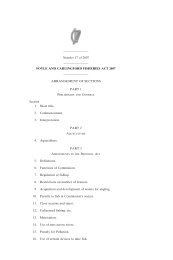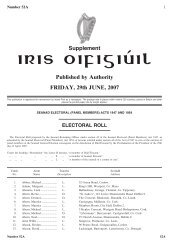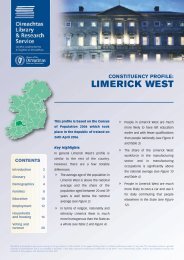Asthma Society of Ireland Opening Statement
Asthma Society of Ireland Opening Statement
Asthma Society of Ireland Opening Statement
You also want an ePaper? Increase the reach of your titles
YUMPU automatically turns print PDFs into web optimized ePapers that Google loves.
<strong>Asthma</strong> is a chronic respiratory disease affecting approximately 10% <strong>of</strong> the population overall. Itcannot be cured but can be managed and controlled.Approximately 1 in 5 children and 1 in 10 adults have asthma meaning everyone in <strong>Ireland</strong>knows someone who has asthma. 60% <strong>of</strong> asthma sufferers do not have their asthma undercontrol, meaning they are at risk <strong>of</strong> having an asthma attack.62 people died from asthma in 2011. Tragically, a large number <strong>of</strong> these deaths werepreventable; asthma is a controllable disease with the right treatment and management.Figures for the first two quarters <strong>of</strong> 2012 are similarly high, and worryingly the figures areparticularly high for the 4-15 age group.2
<strong>Asthma</strong> deaths are preventable. 1 death from asthma is unacceptable."I wouldn't have thought that my Trisha would die <strong>of</strong> an asthma attack in a million years. I'mpaying a very high price for something I didn't know. I'm living without Trisha and that's just anightmare.”Geraldine Smith, mother <strong>of</strong> Trisha Smith who died aged 14 from asthma.Air is the most basic human need, yet 470,000 asthma sufferers in <strong>Ireland</strong> struggle to breathevery day. Fighting to breath is a terrifying experience. <strong>Asthma</strong> sufferers describe feeling likesomeone is standing on their chest or that they are like a fish out <strong>of</strong> water, gasping for breath.Children are as likely to die from poorly controlled mild-moderate asthma as they are fromsevere asthma.3
<strong>Asthma</strong> represents a massive financial burden to an overloaded and under resourced secondaryhealth service. <strong>Asthma</strong> treated correctly in primary care would reduce the strain on hospitalsand free up much needed beds.The high levels <strong>of</strong> ED admissions, hospital bed days, and nebulisations are unnecessary. Theexisting practice <strong>of</strong> allowing asthma symptoms to progress until they require nebulisation orhospital treatment, rather than taking preventative measures in primary care, not only putspatients at risk but wastes much needed hospital resources.<strong>Asthma</strong> does not only have an impact on the health budget. We estimate the total economicburden <strong>of</strong> asthma – including health service expenses and the cost to the exchequer from lostwork and school days- to be €533 million per year.Aside from the economic impact there is the human impact also. Poorly controlled asthma cannot only result in death or hospitalisation, it also limits sufferers quality <strong>of</strong> life. Callers to the<strong>Asthma</strong> Adviceline and patients at <strong>Asthma</strong> <strong>Society</strong> Clinics tell us that they are restricted fromdoing everyday tasks such as playing sport, socialising or even walking up stairs. Parents tell ushow their children are unable to play outside, run with their friends or take part in school sportsdays.Worryingly a huge amount <strong>of</strong> people that the <strong>Asthma</strong> <strong>Society</strong> <strong>of</strong> <strong>Ireland</strong> (ASI) interacts withaccept the restrictions on their lives as inevitable and believe that they will never be able tobreathe freely, not realising that with the right management they can lead healthy, happy lives.4
ASI was established in 1973 by a patient advocate in order to <strong>of</strong>fer support and information toasthma sufferers. The <strong>Society</strong> has evolved over the last 40 years and today provides a broadrange <strong>of</strong> services and education to asthma sufferers.ASI is dedicated to improving the quality <strong>of</strong> life <strong>of</strong> asthma sufferers throughout <strong>Ireland</strong>. ASI doesthis by educating them about; asthma, how to treat and manage their asthma, and what kind <strong>of</strong>care they should expect from their health services.ASI works to improve the level <strong>of</strong> health care received by asthma sufferers by working toeducate and provide resources to healthcare pr<strong>of</strong>essionals, and by advocating on their behalf ata national level.5
The <strong>Asthma</strong> Adviceline has been in operation for over 20 years. It is open every Monday toFriday from 10am to 1pm and is staffed by specialist asthma nurses. Callers to the <strong>Asthma</strong>Adviceline come from all age and socio-economic groups. Callers to the <strong>Asthma</strong> Advicelineinclude asthma sufferers, concerned family members, parents <strong>of</strong> newly diagnosed children,teachers and healthcare pr<strong>of</strong>essionals.ASI <strong>Asthma</strong> Clinics are held in towns and cities throughout the country. For many asthmasufferers they are the first port <strong>of</strong> call to discuss their symptoms. Figures collected at the Clinicsshow disturbingly high levels <strong>of</strong> poor asthma control, lack <strong>of</strong> education about medication andinhaler technique, and few sufferers having an asthma management plan.‘<strong>Asthma</strong> Coach’, an asthma management iPhone App, was launched in November 2012. <strong>Asthma</strong>Coach contains pollen alerts, management tools and emergency information, and feedback fromusers has been overwhelmingly positive so far. <strong>Asthma</strong> Coach was the number one health App in<strong>Ireland</strong> on its release, and has been downloaded by more than 2,000 people to date.ASI interacts with patients on asthmasociety.ie, Facebook and Twitter. Each year ASI distributestens <strong>of</strong> thousands <strong>of</strong> information publications by post and online and runs several majorawareness campaigns on topics such as swine flu, hayfever, and vaccinations.ASI staff and nurses deliver information sessions on asthma in schools and community groupsthroughout <strong>Ireland</strong>, including a programme targeted specifically at disadvantaged groups such asprisoners and the travelling community.6
ASI’s services and resources for asthma sufferers and healthcare pr<strong>of</strong>essionals fill a clear needwithin Irish society.ASI has worked with ICGP to develop <strong>Asthma</strong> Control in General Practice Guidelines which is thestandard by which all asthma patients must be treated in primary care.As part <strong>of</strong> the National <strong>Asthma</strong> Programme, ASI designed and provides a guideline based, onlineeducation programme for all healthcare pr<strong>of</strong>essionals working with asthma patients in <strong>Ireland</strong>.There are currently 900 registered users.ASI also supports healthcare pr<strong>of</strong>essionals by providing train the trainer programmes andfunding research bursaries.ASI designs, produces and delivers its services, literature, training and research extremely costeffectively and provides them entirely free <strong>of</strong> charge. ASI asthma information literature is usedby the HSE as the primary source <strong>of</strong> asthma information for patients and on their healthpromotion website. This level <strong>of</strong> free service provision is <strong>of</strong> obvious benefit to the patient butalso <strong>of</strong>fers a massive saving to the HSE and Department <strong>of</strong> Health.ASI receives no statutory funding. Due to the economic decline in recent years and risingawareness about asthma, demand for ASI’s services is increasing at a steady pace.ASI is a small charity meeting an immense public health need for the largest chronic diseasepatient group in the country.7
ASI’s <strong>Asthma</strong> Demonstration Programme was launched in 2009 and modelled on a FinnishProgramme. Funded entirely by ASI, it investigated the feasibility and benefits <strong>of</strong> structured,guideline based asthma treatment in primary care. 778 patients and 114 healthcarepr<strong>of</strong>essionals took part, with 92% <strong>of</strong> healthcare pr<strong>of</strong>essionals reporting that their patients’asthma control had improved. It was adopted in 2011 by the HSE as the basis for the National<strong>Asthma</strong> Programme (NAP), part <strong>of</strong> the Chronic Disease Programme.The aims <strong>of</strong> NAP may seem ambitious; however the results <strong>of</strong> the Finnish National <strong>Asthma</strong>Programme and ASI’s Demonstration Programme, as well as a wealth <strong>of</strong> international research,suggests that the health benefits <strong>of</strong> structured, guideline based asthma treatment in primarycare are immense, both to the patients and to an overburdened hospital system.Initial plans were for implementation <strong>of</strong> NAP to begin in 2012 however; The first phase <strong>of</strong> patients are yet to be enrolled in NAP No funding has been allocated in the 2013 HSE Service Plan GP contracts must be negotiated with the IMO Training <strong>of</strong> health care pr<strong>of</strong>essionals is required IT systems must be put inplace, with a unique patient identifier system implemented across the entirehealth system Inequity <strong>of</strong> access to medication for severe asthma which is recommendedby national and international treatment guidelines.NAP implementation on a phased basis would be the single most important state healthintervention for asthma suffers. As mentioned earlier, a child or adult with poorly controlledmild to moderate asthma is as likely to die from an asthma attack as someone with severeasthma. For this reason it is imperative that all asthma sufferers are included in NAP.8


